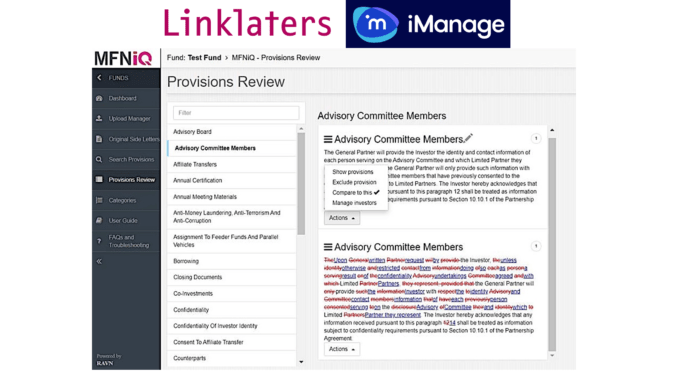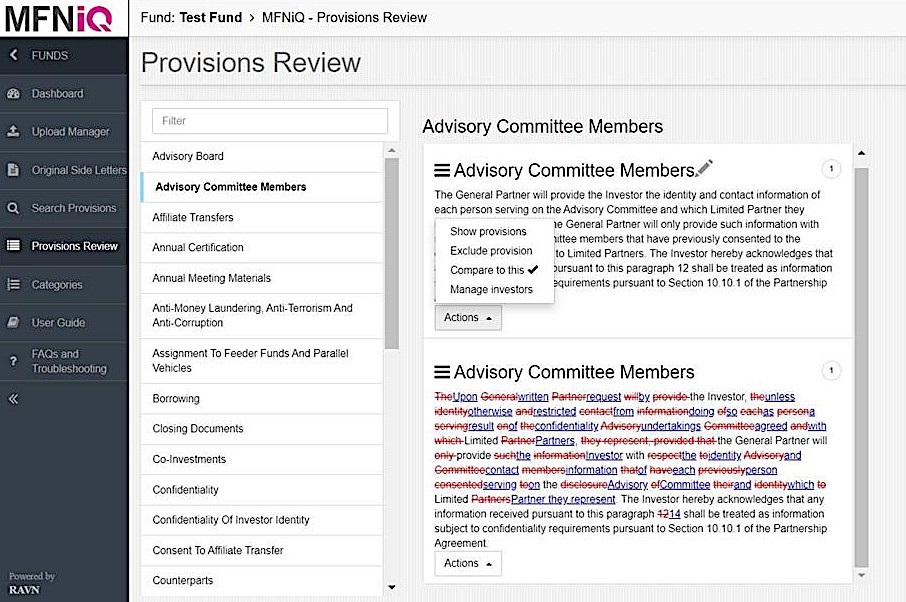
Linklaters has launched a time-saving tool called MFNiQ that moves the laborious challenge of comparing side letters in funds work from a task that ‘took several days, to the push of a button’. The tool was built in partnership with iManage.
The input from the law firm, which involved the investment funds practice, and technology and innovation teams, was covered by Linklaters’ internal innovation funding system, which allocates non-billable time to fee earners to work on product development projects.
All well and good, but what is MFNiQ? In simple terms it works like this: when there is a large fund project many investors, sometimes as many as 200, may ask for a side letter, i.e. a separate bi-lateral agreement in addition to the main contract. These are usually made under what is generically termed a ‘Most Favoured Nation Status’, i.e. that the bi-lateral terms are no worse than the terms any other party involved in the investment is getting.
In short, this creates a huge legal data comparison challenge, as side letters can go from five pages to as long as 50 pages, and every one of the provisions inside them need to be compared against all the others in all the other side letters. I.e. it’s a massive time sink.
Traditionally, the lawyers involved – and often the junior lawyers – had to create very complex matrices in Word docs or with Excel to cross reference all the information to make sure all the parties would be happy with what had been agreed.
As you can imagine, this slows down the deal, and although it’s 100% necessary, the clients would rather focus on the negotiations, not the side letter matrix. So, Linklaters approached iManage to see if they could help.
As Matt Keogh, global head of the Linklaters investment funds practice, explained to Artificial Lawyer: ‘This [tool] makes it quicker and less expensive for the client, and it’s also less of a burden on the junior lawyers.’
Keogh added that with this new tool they had such a useful ability that they would be able to help clients on the side letter challenge even if they were not leading on the main part of the investment advice. I.e. the use of legal tech here could become a way to gain client goodwill and widen their reach in the market.
The tool has already been used in fundraising deals in London and New York with very positive client feedback and has now been rolled out across the firm’s investment funds practice globally, including in offices in the key financial hubs of Paris, Frankfurt, Luxembourg, Hong Kong and Tokyo.
‘Before it was a very mechanical process,’ Keogh said and noted that by using iManage’s pattern recognition capabilities to analyse the text of all the side letters they ‘can also reduce risk’.
The system can see similarities in provisions even if there is a different wording used in the various side letters.

Keogh added that they had also developed – without initially aiming to – the ability to keep track of the completion of the negotiations around the side letters as part of the tool. This gives benefits similar to those gained from using a transaction management system for an M&A deal, for example.
More broadly, Keogh explained that driving efficiency both internally and for the clients ‘was the direction of travel’ now in the legal market. And clearly, Linklaters wants to be at the front of this.
Interestingly, Keogh added: ‘Clients know the difference between high value and low value work, [so] tech is as much about relationships as it is a solution to something.’
This is a welcome and progressive approach, i.e. seeing tech as part of a much wider change in how law firms work. As this site often says: legal tech is about so much more than the technology itself. In this case, it’s about: economics, efficiency (naturally), reducing risk, improving the working lives of the junior lawyers, and sustaining positive client relationships, and finally it can also be seen as something of a business development tool.
Last words go to Nick Thomson, General Manager, iManage AI, who added in a statement: ‘Helping our clients automate laborious processes that get in the way of delivering great service is what we’re all about. We’re really delighted to have supported Linklaters and their intelligent approach to building the MFNiQ solution.’
And also Emily Harmsworth, Counsel at Linklaters who led on the development of the tool: ‘MFNiQ enables our lawyers to instantly compare all side letter clauses being negotiated on a fundraise, which increases efficiencies within our deal teams whilst also helping to reduce unnecessary drafting variances. The dedication and time from the teams involved in this project is a real testament to our innovative mindset and I’m excited that we have something incredibly valuable to offer our clients.’
2 Trackbacks / Pingbacks
Comments are closed.